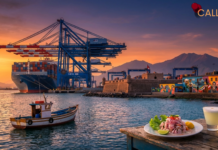
The testing, inspection, and certification services provider Bureau Veritas (BV) has delivered an Approval in Principle (AiP) to the maritime company Zéphyr & Borée for its first open-top 1,800TEU container ship, demonstrating the feasibility of using wind-propelled wing-sails on this type of vessel.
“Wind propulsion systems can play a significant role by providing substantial propulsive energy,” stated the Senior Vice President Technical & Operations at Bureau Veritas Marine & Offshore, Laurent Leblanc, who added, “With this AiP, we are pleased to demonstrate the technology can be applied to containerships, which represent 17.5% of the global fleet, in tonnage.”
The AiP confirms the design’s compliance with the most recent BV notations, including NR 206 on Wind Propulsion systems, according to the French company.
The 185 meter-long container vessel is designed with five cargo holds, mostly open-top, according to BV. Propulsion means are compliant with International Maritime Organization’s (IMO) Tier III requirements, and the vessel is equipped with shaft generators and a heat recovery system that minimises fuel consumption.
The feeder’s propulsion system will be assisted by eight sails provided by Computed Wing Sails (CWS). The design is a thick, asymmetrical wing-sail that can be steered to catch port and starboard winds, adjusting itself automatically to the wind conditions, in order to ensure optimal savings.
Among emerging options to decarbonise a fleet, Bureau Veritas believes that wind-assisted propulsion is considered a strong contender for achieving significant emissions reduction, using a free, clean and renewable energy source available worldwide.
Nils Joyeux, CEO at Zéphyr & Borée, claimed that wind energy will play an important role in the years to come to decarbonise ships’ propulsion. “The integration of sails on container ships is an important technical challenge on which we are working hard at Zéphyr & Borée,” he said.
Bureau Veritas has released classification rules that provide a framework for wind propulsion systems (WPS), which address safety and reliability from the design review stage through installation and operations, in order to help clients move forward with wind-assisted propulsion.
“To comply with WPS rules, ships must undergo a risk analysis, determine local and general ship strength, and define load cases, automation and release systems,” pointed out BV.




